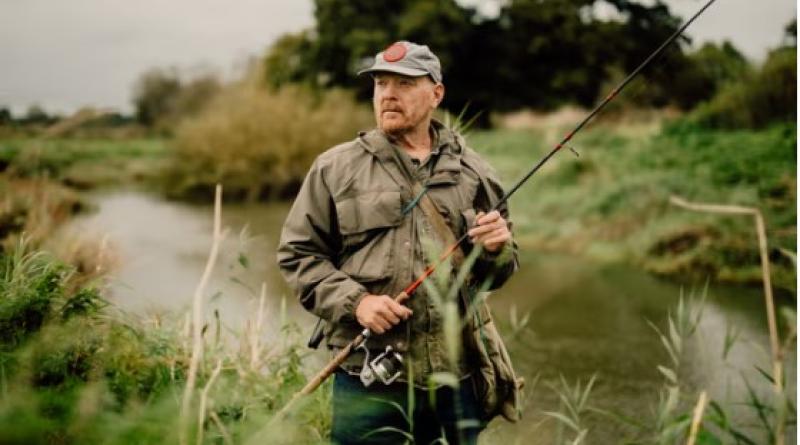‘I won’t pay for them to pollute my river’: why a water bills boycott in England is growing

Angler Mike Deacon is among a growing number of customers refusing to pay water companies as they protest against sewage spillages and contamination
For 13 years, Mike Deacon monitored pollution levels in the river Ouse in Sussex, gathering data as a volunteer to help the Environment Agency take action. As a lifelong angler who grew up close to the river, its waters were precious to him.
Now he is taking Southern Water to court, counter-suing the company for “loss of amenity” after it began legal action over his unpaid bills. Since 2021 Deacon has refused to pay more than £1 a month because he blames Southern Water for river pollution.
“That’s all they deserve,” he said. “I won’t pay them for polluting my local river. Their contribution to pollution in the river system and the seas has led to a reduction in fish stocks. I can’t swim in the river any more. I can’t go kayaking there any more.”
Deacon is one of a number of customers withholding money from their water bills, with others joining a bills boycott and refusing to pay the wastewater element of their bills in protest at river and sea pollution.
Earlier this month, the Consumer Council for Water said more customers complained about Southern Water than any other water company and named it and Thames Water as the “standout poor performers” in dealing with complaints.
The water industry has been under fire over leaks and sewage spills, and for taking out debts worth £54bn since privatisation in 1989 while paying out £66bn to shareholders during the same period. Companies have asked customers to foot a £96bn bill to upgrade the water network, with plans to tackle sewage, reduce leaks and build new reservoirs.
“So, on the one hand, I’m having to pay for them to pollute my river,” Deacon said. “And on the other, I’m having to pay for their fines, and put money into the pockets of their shareholders. I’m not doing it.”
Deacon, a former advertising art director, began fishing at the age of five, catching eels with his father and getting along to the river with his friends from the Landport estate in Lewes whenever he could.
The Sussex Ouse flows for 42 miles through the county, taking in a network of 750 miles of rivers, streams and brooks, including chalk streams where sea trout spawn and grow from small fry into fish. “As I got older I started to learn more about the species and their habits and lifestyles, and started catching the occasional sea trout – this magnificent fish that was a bit of an enigma,” said Deacon.
In 2009, he was so dismayed by the state of the river that he organised a clean-up, inviting local people to clear a stretch of the river in Lewes: they pulled out 28 shopping trolleys, 12 bikes and two full-sized goalposts in a section of river just 30 metres by 10 metres.
“The Environment Agency was saying ‘it’s not our job’, and the council was saying ‘it’s not our job’, so I organised a clean-up,” he said.
As a result, the Sussex Ouse Conservation Society, which is now the Ouse and Adur Rivers Trust (OART), recruited him to be its pollution monitor – a role that he gave up last month because of his dispute with Southern Water – and he worked on several serious pollution incidents, gathering water samples and evidence used by the Environment Agency to enforce pollution controls.
Deacon was also tasked with collecting water samples from sites across his catchment to be analysed for water quality in the OART laboratory.
Water companies are not solely responsible for pollution in rivers. Farmers abstract water for their crops and use fertilisers, which can run off into rivers. Tyre and exhaust particles also run off roads.
Water companies are also allowed to pump untreated sewage into rivers on days of unusually heavy rainfall, but Southern Water has been accused of “dry spills” – pumping in sewage on dry days. In 2021, Southern Water was fined a record £90m after pleading guilty to 6,971 unpermitted sewage discharges.
Deacon said that by measuring pollutants in the river, he could see that the sewage discharges by the 34 treatment plants upstream of his stretch were contributing to a deterioration of river environment for the fish and wildlife. He believes there has been a drop of 75% in the levels of roach, bream and dace and he believes sea trout may become extinct in the Sussex Ouse if pollution remains at its current levels. Southern Water disputes this claim.
The most recent salmonid and freshwater fisheries data shows that in 2021 there were 17 sea trout catches in the Sussex Ouse reported by licensed anglers, substantially lower than the 10-year mean of 54.4 per year. Until 2018, anglers caught at least 50 sea trout a year, except in 2016.
Katy Colley, from the website boycottwaterbills.com, said: “We only recently became aware of Mike’s personal fight but he is not alone. We know there are thousands of people all over the country who feel they can no longer stand by and watch as criminal polluters destroy our precious ecosystems. We know how important the Sussex Ouse is to Mike and we salute his courage, tenacity and passion in taking on Britain’s worst performing water company.”
Southern Water said it had paid no dividends since 2017 and customer bills had fallen in real terms by 20% since 2010. A spokesperson added: “We are aware of a very small number of claims and counter-claims from customers who are being pursued for unpaid bills. No claim that has reached court has been successful, and we will continue to defend any claims vigorously.
“We are very conscious of the impact we have on our environment and work carefully to protect it. We are investing £3bn between 2020 and 2025 – equivalent to £1,500 per household – to improve environmental performance, prevent pollution and fix leaks.
“We are also working hard to balance making vital improvements to our network while keeping customer bills as low as possible, and will only move at a pace that is acceptable to both our communities and the regulator.”





